John Joseph Adams Books
With the support of the publisher, Shelf Awareness celebrates John Joseph Adams Books, a new imprint from Houghton Mifflin Harcourt.
With the support of the publisher, Shelf Awareness celebrates John Joseph Adams Books, a new imprint from Houghton Mifflin Harcourt.
John Joseph Adams is the editor of John Joseph Adams Books, an imprint of Houghton Mifflin Harcourt that is publishing six titles this year (more on those in the following article). He is also the series editor of Best American Science Fiction and Fantasy and the editor of more than two dozen anthologies, including The Living Dead and Wastelands. In addition, he is editor and publisher of the magazines Nightmare and the Hugo Award-winning Lightspeed and is a producer for WIRED's The Geek's Guide to the Galaxy podcast. Here he graciously and thoughtfully answers questions from Shelf Awareness.
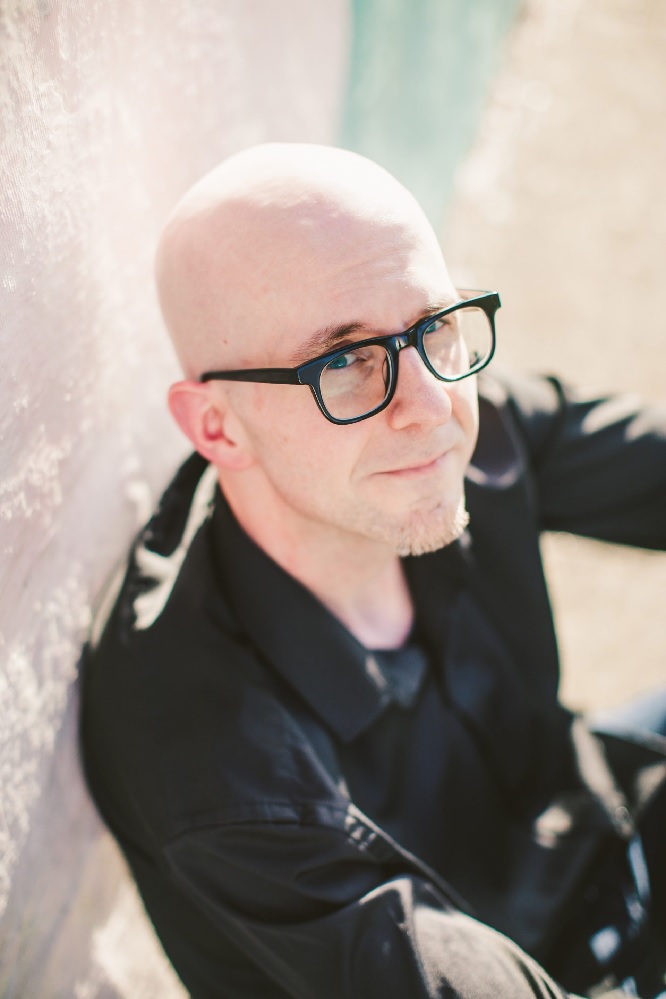 |
|
| John Joseph Adams | |
What is the focus of the imprint?
John Joseph Adams Books is a general science fiction and fantasy imprint dedicated to publishing bestselling and award-winning science fiction and fantasy from a diverse range of voices, both new and established--and we aim to bring readers fiction that is literary and accessible, sometimes experimental, and always full of a sense of wonder.
Who will be working with you on the imprint?
We're doing just 7-10 books a year, so I'm the only acquiring editor for the imprint. I report directly to Bruce Nichols, the publisher of Houghton Mifflin Harcourt's trade division, so he and I work closely together deciding on advances and publishing strategies for each title. Additionally, we have an in-house editorial liaison for the imprint (necessary since I work remotely). That role is now handled by Jaime Levine, former editorial director of Warner Aspect (and former editor of one of the imprint's authors--Carrie Vaughn).
How will your work editing anthologies and magazines and doing podcasts fit in with the imprint?
All of my work in short fiction provides the foundation for my broad knowledge of the genre. By reading extensively in short fiction, you can expose yourself to a very wide range of styles and plotlines, easily much more than if you read novels exclusively--not just because it's shorter and thus, of course, you can read maybe 20 stories in the span it would take you to read one novel, but also because short fiction authors can afford to take more chances with unusual forms or plots, since short fiction (on an individual story basis) is more or less a non-commercial venture. So short fiction really exposes you to this very broad range of ideas by default, and I think that kind of widely varied reading is a great thing for an editor. And, of course, reading widely in short fiction--as I have to do for Best American Science Fiction and Fantasy (BASFF)--allows me to keep tabs on who the new up-and-comers are, and who might be the next hot writer to watch.
Or, to answer your question more practically: they don't really fit--so by necessity now they're kind of my side hustle. But I will always love short fiction and can't imagine ever ceasing editing magazines or anthologies completely. In order to make time for editing novels, I had to scale back the number of anthologies I've been doing--though I still managed to publish two each year so far (including BASFF, which naturally takes up a lot of my time), plus 12 issues of two different magazines.
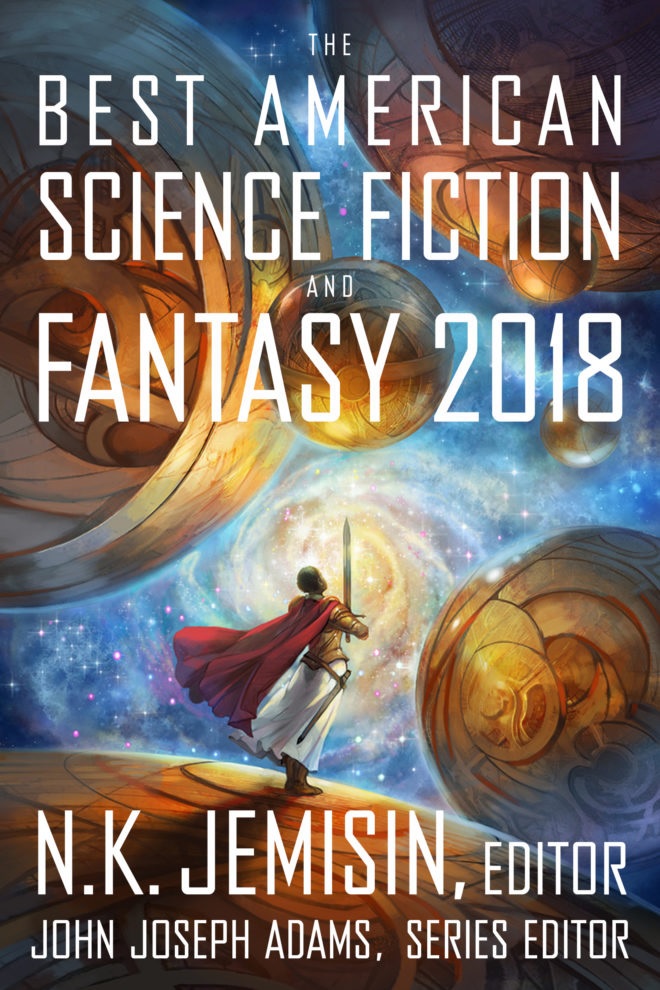 What do you love most about your work?
What do you love most about your work?
Aside from the obvious--that I get to read science fiction and fantasy works as my job--I really love the thrill of discovery, of going into a book with no idea what to expect and then be blown away... and then being able to champion such works when they're ready to be shared with the world. Naturally I also love working with authors whose books and stories I'm already a fan of, but there's a special place in my heart that lights up when I find those new voices for the first time. It's also really gratifying when the books I'm championing are recognized and honored, such as when Carrie Vaughn won the 2018 Philip K. Dick Award for Bannerless.
Have you had any surprises good or bad so far in launching the imprint?
One surprise was seeing for myself how much publishers--including HMH--are willing to spend on a book. In our case, it was, of course, nice to see how far we were willing to go to get this or that (even when we were eventually outbid). Obviously I had heard of big book deals, but it was different seeing one go down from the inside.
One bad surprise, though in retrospect this shouldn't have been a surprise, was how much it broke my heart to lose the books I wasn't able to acquire. Coming from short fiction, where "no simultaneous submissions" is the norm, I was used to being able to buy whatever I had on submission--if I liked a story submitted to me, I'd get to buy it. I knew, obviously, that that wouldn't always happen in novel publishing, since other publishers would be competing for the same books, but I didn't predict how attached and invested I'd get in these books, that I'd be left with this profound sense of loss that I didn't get to be the editor that shepherded those books into the world.
How does having your own imprint help in publishing as you wish?
Well, it's funny--in short fiction I basically have total control over everything. I'm like an editorial dictator (a benevolent one I'd like to think), whereas with the imprint, I'm more like a president or prime minister---i.e., I have a lot of editorial power, but not unchecked power. As noted above, sometimes you lose an auction, and thus you don't get to publish exactly as you wish, but then also there are a lot of marketing considerations that go into offering on a novel that are not really relevant to a single short story; for short stories, the overall package has to be marketable/appealing--i.e., the whole anthology, or the magazine--but an individual story doesn't have that burden, whereas every novel stands (or falls) on its own.
What should booksellers and librarians know about your imprint and what you plan to publish?
Outside of my work on the imprint, I also serve as series editor for Best American Science Fiction and Fantasy, and when I do my reading for that obviously I'm trying to find the best of the best, only the highest quality material. I'm basically approaching my novel acquisitions the same way--so I'm applying the same level of tight curation as I do with BASFF. (Except with John Joseph Adams Books, of course, there's no restriction to only American material.) Anyone who's read one of the BASFF volumes, or my magazine Lightspeed, should have a good sense of the kinds of fiction that will end up published by John Joseph Adams Books. Likewise, I've edited more than two dozen anthologies covering a wide variety of themes, so I think one could look to that body of work to see what kinds of things might end up on the JJA Books roster.
The books being published this year by John Joseph Adams Books are by a range of authors--newcomers and established writers alike--who explore a range of science fiction and fantasy.
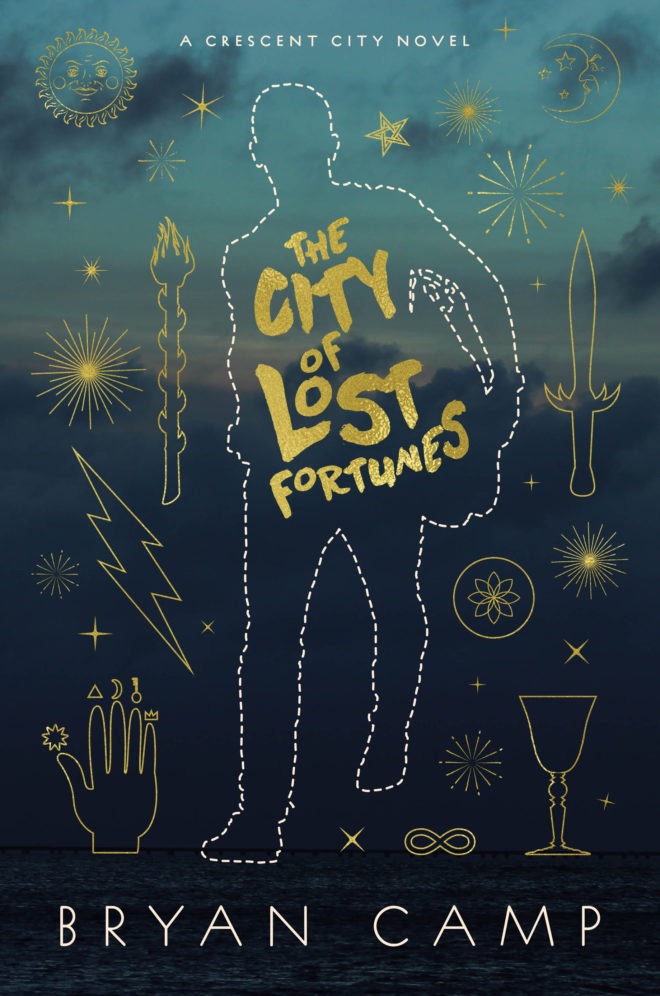 The City of Lost Fortunes by Bryan Camp (John Joseph Adams/Houghton Mifflin Harcourt, $24, 9781328810793; April 17). Jude Dubuisson is a street magician who can perform real magic. Thanks to a supernatural father, Jude has the ability to locate missing objects, but his gift has been difficult to use ever since Hurricane Katrina scattered so many people and belongings. He's been retired for six years, hiding from a divine former employer, a debt he owes to the Fortune god of New Orleans and his own abilities. But when the Fortune god dies, Jude is drawn back into a world of monsters and magic threatened by a plot against the soul of New Orleans.
The City of Lost Fortunes by Bryan Camp (John Joseph Adams/Houghton Mifflin Harcourt, $24, 9781328810793; April 17). Jude Dubuisson is a street magician who can perform real magic. Thanks to a supernatural father, Jude has the ability to locate missing objects, but his gift has been difficult to use ever since Hurricane Katrina scattered so many people and belongings. He's been retired for six years, hiding from a divine former employer, a debt he owes to the Fortune god of New Orleans and his own abilities. But when the Fortune god dies, Jude is drawn back into a world of monsters and magic threatened by a plot against the soul of New Orleans.
Bryan Camp is a graduate of the Clarion West Writers Workshop and the University of New Orleans's MFA program. He first began work on The City of Lost Fortunes in the back seat of his family's car as they evacuated ahead of Hurricane Katrina. The City of Lost Fortunes is his debut novel, and the beginning of the Crescent City urban fantasy series.
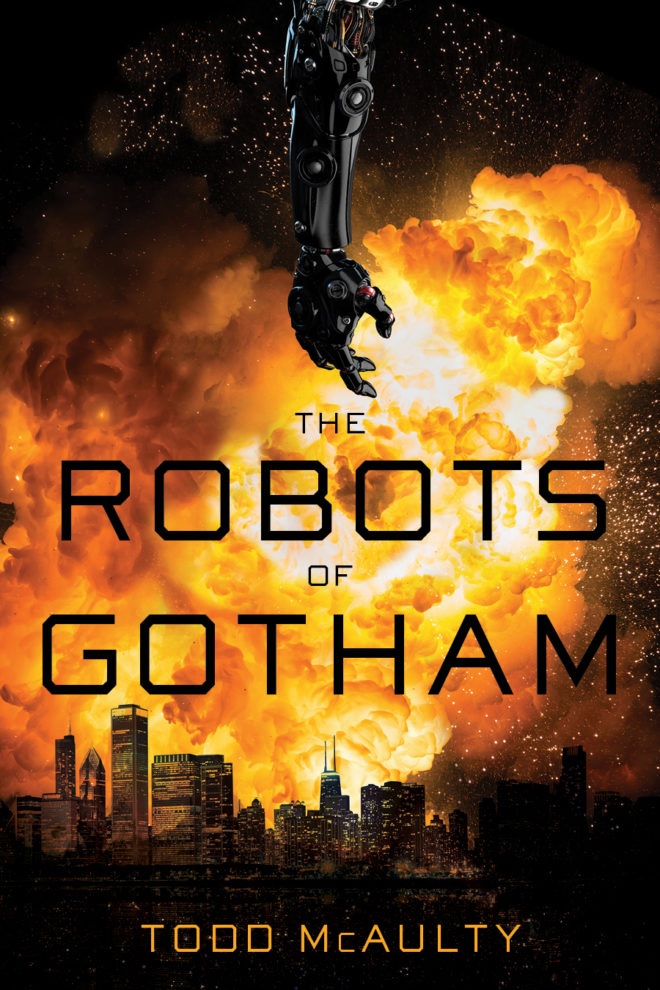 The Robots of Gotham by Todd McAulty (John Joseph Adams/Houghton Mifflin Harcourt, $26, 9781328711014; June 19). In the year 2083, the world is on the brink of total domination by militant machines. Huge swathes of the United States are occupied by foreign forces after a coalition of nations secretly ruled by AIs won a brutal war. While a robot monarchy annexes Manhattan, what remains of the U.S. government attempts to sue for peace. Barry Simcoe, a Canadian businessman, is traveling in Chicago when a rogue machine attacks his hotel. In the aftermath, he meets a Russian medic and a damaged robot called 19 Black Winter. Together they uncover a conspiracy to unleash a plague across the continent and find that the forces of resistance in America are stronger than the machines let on.
The Robots of Gotham by Todd McAulty (John Joseph Adams/Houghton Mifflin Harcourt, $26, 9781328711014; June 19). In the year 2083, the world is on the brink of total domination by militant machines. Huge swathes of the United States are occupied by foreign forces after a coalition of nations secretly ruled by AIs won a brutal war. While a robot monarchy annexes Manhattan, what remains of the U.S. government attempts to sue for peace. Barry Simcoe, a Canadian businessman, is traveling in Chicago when a rogue machine attacks his hotel. In the aftermath, he meets a Russian medic and a damaged robot called 19 Black Winter. Together they uncover a conspiracy to unleash a plague across the continent and find that the forces of resistance in America are stronger than the machines let on.
Todd McAulty is an expert in artificial intelligence who earned his Ph.D. by using supercomputers to solve problems involving large amounts of data. He was part of the start-up that created the Internet Explorer web browser and is the director of a machine learning company. The Robots of Gotham is his first book.
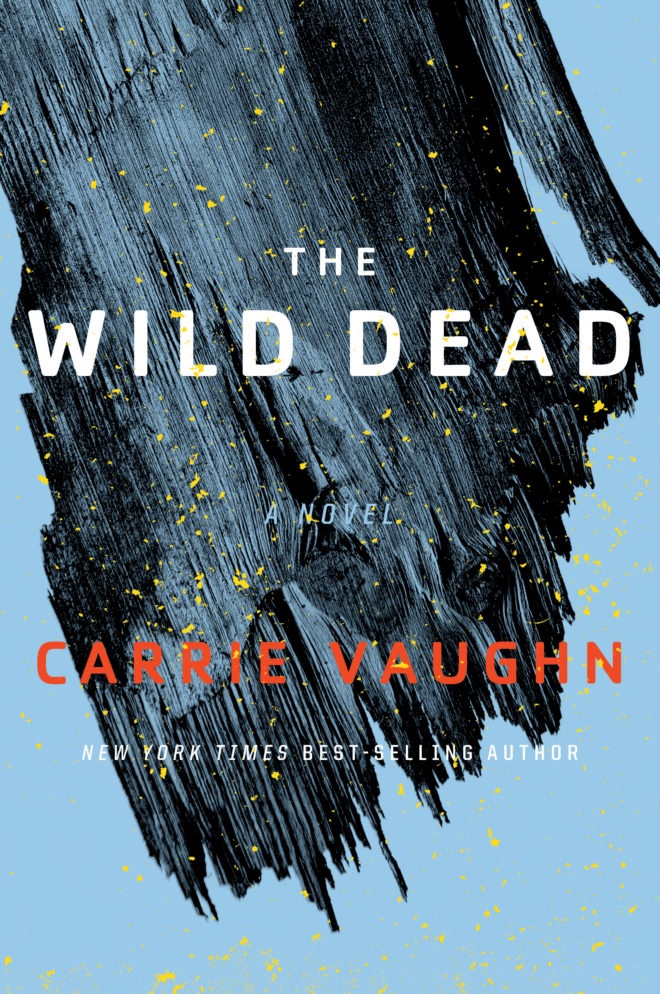 The Wild Dead by Carrie Vaughn (John Joseph Adams/Mariner Books, $14.99, 9780544947313; July 17). In 2017, Carrie Vaughn introduced the Bannerless Saga with Bannerless, a post-apocalyptic dystopia in which birth control is mandatory and households earn symbolic banners when they are granted the right to bear children. On the thriving Coast Road, Enid of Haven investigates transgressions against a community determined not to repeat the mistakes of their predecessors. The Wild Dead returns to the Coast Road and Investigator Enid, now partnered with Teeg, who is sent to settle a conflict over outlying territory. But when a murdered woman ends up belonging to the nomadic tribes outside the Coast Road, Enid is faced with a jurisdictional and ethical crisis.
The Wild Dead by Carrie Vaughn (John Joseph Adams/Mariner Books, $14.99, 9780544947313; July 17). In 2017, Carrie Vaughn introduced the Bannerless Saga with Bannerless, a post-apocalyptic dystopia in which birth control is mandatory and households earn symbolic banners when they are granted the right to bear children. On the thriving Coast Road, Enid of Haven investigates transgressions against a community determined not to repeat the mistakes of their predecessors. The Wild Dead returns to the Coast Road and Investigator Enid, now partnered with Teeg, who is sent to settle a conflict over outlying territory. But when a murdered woman ends up belonging to the nomadic tribes outside the Coast Road, Enid is faced with a jurisdictional and ethical crisis.
Carrie Vaughn is the bestselling author of the Kitty Norville books, the Golden Age superhero novels, the YA novels Voices of Dragons and Steel, and the fantasy novel Discord's Apple. Her novel Bannerless won the 2018 Philip K. Dick Award, her short fiction has been nominated for Hugo Awards and she is a contributor to George R.R. Martin's Wild Cards series. (See more about her in the following article.)
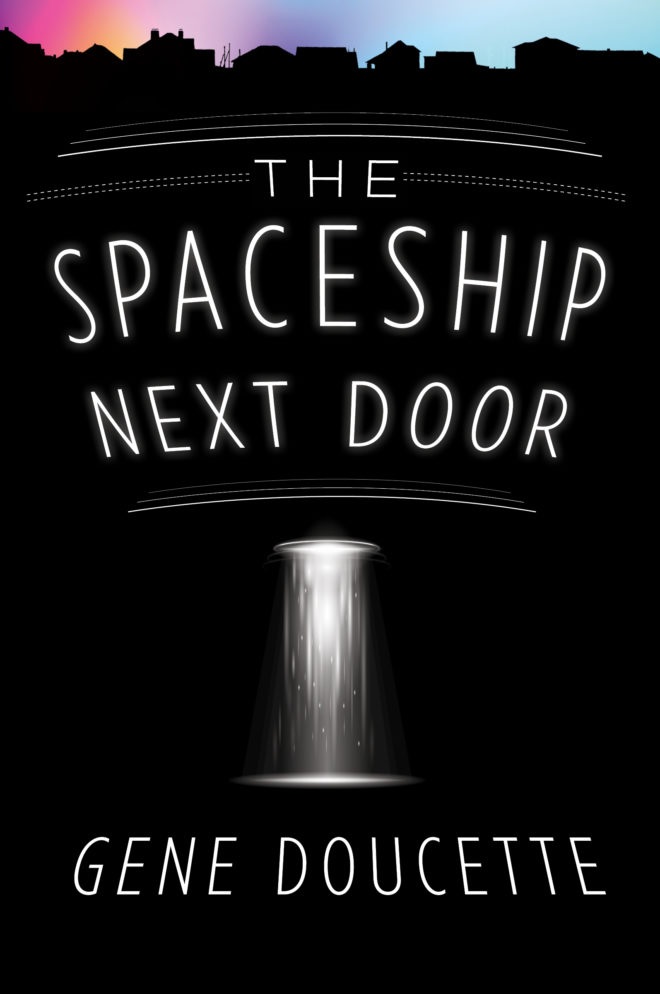 The Spaceship Next Door by Gene Doucette (John Joseph Adams/Mariner Books, $15.99, 9781328567468; September 4). An alien spaceship landed in the peaceful mill town of Sorrow Falls, Mass., three years ago. As expected on first contact with extraterrestrial life, there was quite a commotion. That hubbub died down when the ship did nothing--not even open its doors--for three years. Teenager Annie Collins is one of the mystery craft's nearest neighbors. When an undercover government agent disguised as a journalist shows up in Sorrow Falls, he discovers Annie Collins may have more answers about the ship than anyone else is aware of, including herself.
The Spaceship Next Door by Gene Doucette (John Joseph Adams/Mariner Books, $15.99, 9781328567468; September 4). An alien spaceship landed in the peaceful mill town of Sorrow Falls, Mass., three years ago. As expected on first contact with extraterrestrial life, there was quite a commotion. That hubbub died down when the ship did nothing--not even open its doors--for three years. Teenager Annie Collins is one of the mystery craft's nearest neighbors. When an undercover government agent disguised as a journalist shows up in Sorrow Falls, he discovers Annie Collins may have more answers about the ship than anyone else is aware of, including herself.
Gene Doucette is a playwright, screenwriter and author of the Immortal series and Fixer, a sci-fi thriller. The Spaceship Next Door was independently published in 2015, with a sequel, The Frequency of Aliens, released in 2017.
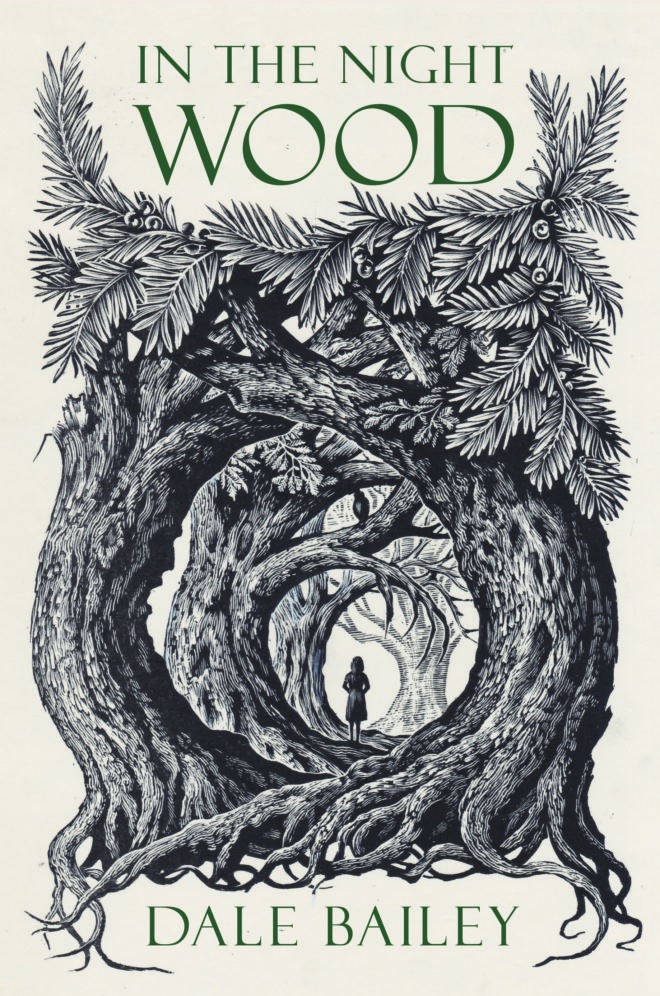 In the Night Wood by Dale Bailey (John Joseph Adams/Houghton Mifflin Harcourt, $23, 9781328494436; October 9). American scholar Charles Hayden travels to England to write a biography about Victorian writer Caedmon Hollow, author of the children's book In the Night Wood. Hayden also seeks escape from his own demons as a failed family man. He moves into Hollow's home in remote Yorkshire, and soon discovers the darkness of the Victorian fantasist's past is still present. Hayden meets a mysterious woman and child, echoes of what he has lost, and each day he feels the shadowy presence of the forest growing closer and closer.
In the Night Wood by Dale Bailey (John Joseph Adams/Houghton Mifflin Harcourt, $23, 9781328494436; October 9). American scholar Charles Hayden travels to England to write a biography about Victorian writer Caedmon Hollow, author of the children's book In the Night Wood. Hayden also seeks escape from his own demons as a failed family man. He moves into Hollow's home in remote Yorkshire, and soon discovers the darkness of the Victorian fantasist's past is still present. Hayden meets a mysterious woman and child, echoes of what he has lost, and each day he feels the shadowy presence of the forest growing closer and closer.
Dale Bailey is the author of seven books, including The End of the End of Everything and The Subterranean Season. His story "Death and Suffrage" was adapted for Showtime's Masters of Horror TV series. Bailey's other short fiction has won the Shirley Jackson Award, the International Horror Guild Award, been nominated for the Nebula and Bram Stoker awards and been featured in numerous anthologies.
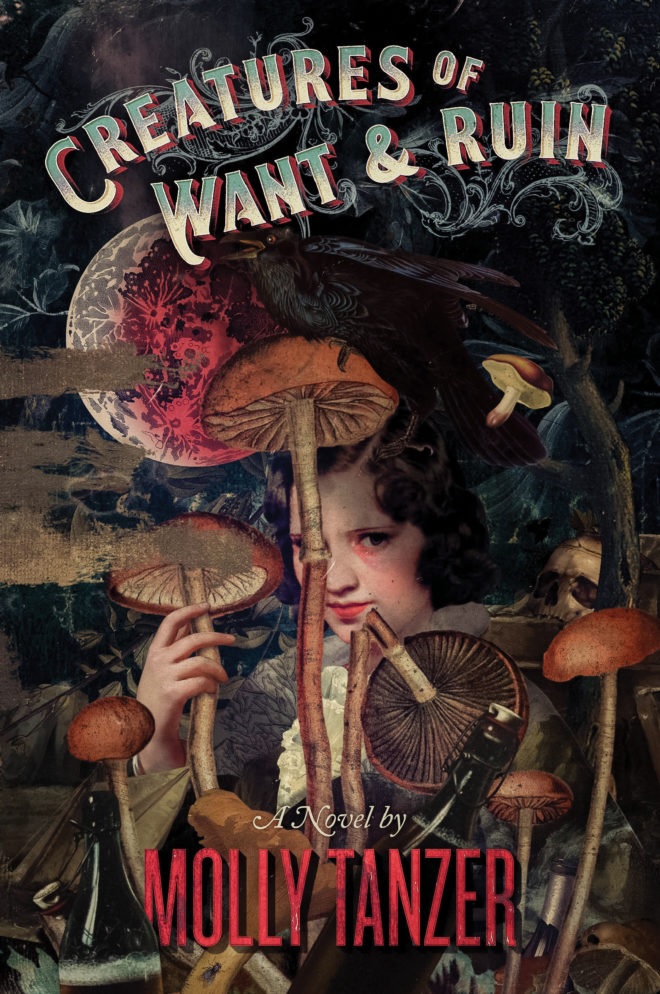 Creatures of Want and Ruin by Molly Tanzer (John Joseph Adams/Mariner Books, $16.99, 9781328710253; November 13). In 2017, Molly Tanzer's Creatures of Will and Temper introduced a Victorian London rife with underground demonic cults. In Creatures of Want and Ruin, Tanzer jumps to a 1920s Long Island with similar devilish problems. It's the midst of Prohibition, and Amityville fisherwoman Ellie West raises money for her brother's college education by bootlegging moonshine. Her operation is precarious and gets even more so when she accidentally sells tainted booze to rich merrymakers. This liquor is the product of a diabolist cult and their demonic mushrooms, a product that inflicts its drinkers with visions of fire and floods. Now it's up to Ellie to make sure those visions don't come true.
Creatures of Want and Ruin by Molly Tanzer (John Joseph Adams/Mariner Books, $16.99, 9781328710253; November 13). In 2017, Molly Tanzer's Creatures of Will and Temper introduced a Victorian London rife with underground demonic cults. In Creatures of Want and Ruin, Tanzer jumps to a 1920s Long Island with similar devilish problems. It's the midst of Prohibition, and Amityville fisherwoman Ellie West raises money for her brother's college education by bootlegging moonshine. Her operation is precarious and gets even more so when she accidentally sells tainted booze to rich merrymakers. This liquor is the product of a diabolist cult and their demonic mushrooms, a product that inflicts its drinkers with visions of fire and floods. Now it's up to Ellie to make sure those visions don't come true.
Molly Tanzer is the author of Vermillion, nominated for the Sydney J. Bounds and Wonderland Book Award, the historical crime novel The Pleasure Merchant, and A Pretty Mouth. She is also the co-creator of Mixed Up: Cocktail Recipes (and Flash Fiction) for the Discerning Drinker (and Reader).
 The Best American Science Fiction and Fantasy 2018, edited by John Joseph Adams and N.K. Jemisin (Mariner Books, $15.99, 9781328834560; October 2). Series editor John Joseph Adams and guest editor N.K. Jemisin collect the year's best examples of science fiction and fantasy. For contemporary genre fans, this means stories that explore new frontiers of perspective and style from a range of voices--with all the classic satisfaction of dragons and spaceships. The answer to what it means to be human has never been so diverse.
The Best American Science Fiction and Fantasy 2018, edited by John Joseph Adams and N.K. Jemisin (Mariner Books, $15.99, 9781328834560; October 2). Series editor John Joseph Adams and guest editor N.K. Jemisin collect the year's best examples of science fiction and fantasy. For contemporary genre fans, this means stories that explore new frontiers of perspective and style from a range of voices--with all the classic satisfaction of dragons and spaceships. The answer to what it means to be human has never been so diverse.
N.K. Jemisin is the author of the Broken Earth series, which won the Hugo Award for Best Novel in both 2016 and 2017, for The Fifth Season and The Obelisk Gate, respectively. The third entry, The Stone Sky, was released in August 2017. She is also author of the Inheritance trilogy and the Dreamblood series.
Carrie Vaughn is the author of more than 20 bestselling novels and more than 80 short stories. She's best known for the Kitty Norville urban fantasy series, about a werewolf who hosts a talk radio advice show for supernatural beings, a series that consists of 14 novels and a collection of short stories. And she's known for the superhero novels in the Golden Age saga, the YA novels Voices of Dragons and Steel, and the fantasy novel Discord's Apple. She's a contributor to the Wild Cards series of shared-world novels edited by George R.R. Martin, and also writes the Harry and Marlowe steampunk short stories about an alternate 19th century that makes use of alien technology. She won the Philip K. Dick Award for her novel Bannerless, has been nominated for the Hugo Award, various RT Reviewer Choice Awards--winning for Best First Mystery for Kitty and the Midnight Hour--and won the 2011 WSFA Small Press award for best short story for "Amaryllis." John Joseph Adams is publishing her latest novel, The Wild Dead, on July 17.
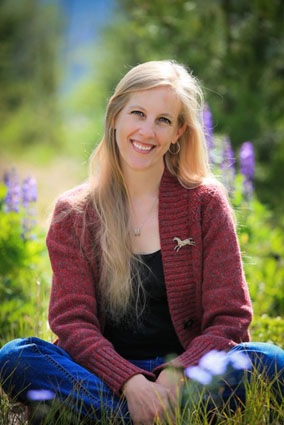 |
|
| Carrie Vaughn | |
On your nightstand now:
Valis by Philip K. Dick. I haven't read Valis before--I recently received a stack of Philip K. Dick's novels and am working my way through them. I read A Scanner Darkly right before this one, and much like it, Valis is steeped in California drug culture of the '60s and '70s, and that makes it a bit sad. But what sets Dick's books apart are how he deals with perceptions and point of view and the idea of constructed reality. It's fascinating.
Favorite book when you were a child:
Charlotte's Web by E.B. White. Charlotte's Web was the first book that ever made me cry, and I read it over and over again because it affected me so deeply and was so powerful.
Your top five authors:
Right at the moment they are Robin McKinley, Lois McMaster Bujold, Ray Bradbury, Iain M. Banks, and Patricia McKillip.
Book you've faked reading:
Rendezvous with Rama by Arthur C. Clarke, mostly because the conversation usually moves past it before I get a chance to admit I haven't read it, and I also hate to admit that I haven't read one of Clarke's best-known novels when I've read just about everything else he's written.
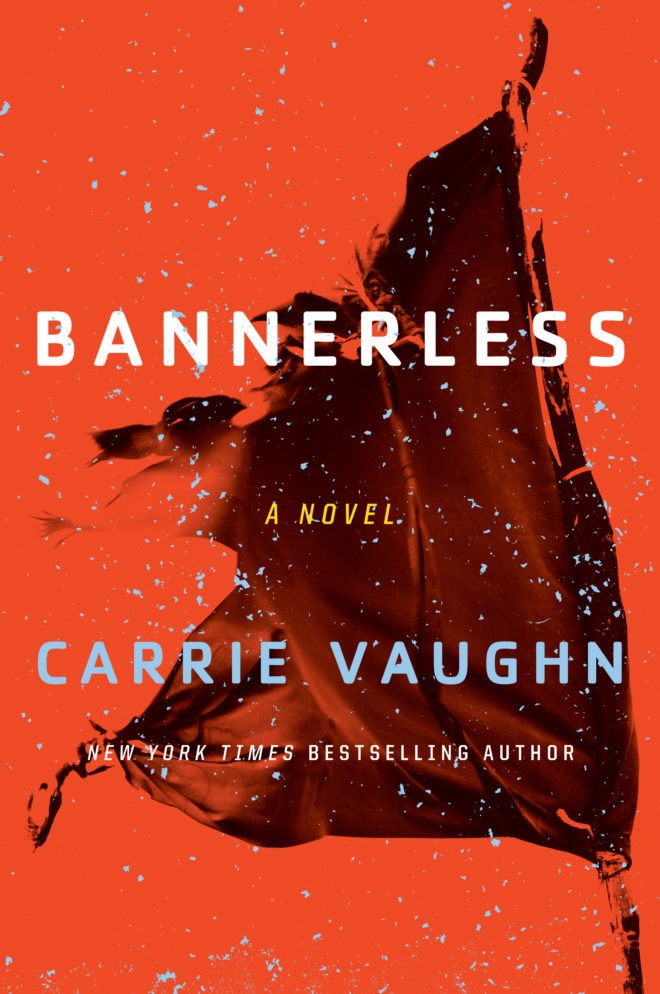 Book you're an evangelist for:
Book you're an evangelist for:
There are so many, depending on the situation. I'm going to go with Moby Dick by Herman Melville, because it's a great book that gets such a bad rap and I'm always defending it. The second may be Joseph Conrad's Heart of Darkness.
Book you've bought for the cover:
Wild Cards Vol. 5: Down and Dirty, the original Bantam cover from the '80s, which is this funky airbrushed portrait collage thing. I'd never seen anything like it. Got me hooked on the whole series.
Book that changed your life:
Dandelion Wine by Ray Bradbury made me want to be a writer.
Favorite line from a book:
"Aim high. You may still miss the target but at least you won't shoot your foot off." from Komarr by Lois McMaster Bujold.
Book you most want to read again for the first time:
Probably The Blue Sword by Robin McKinley or The Last Unicorn by Peter Beagle.